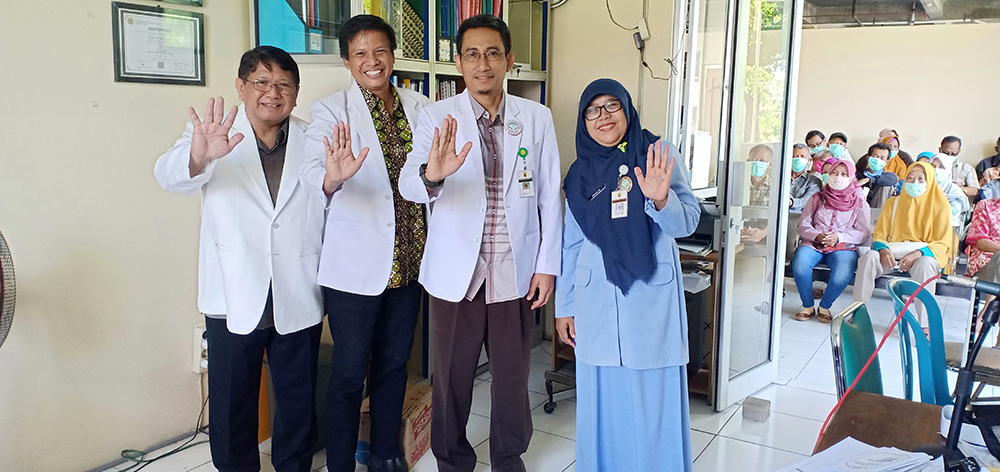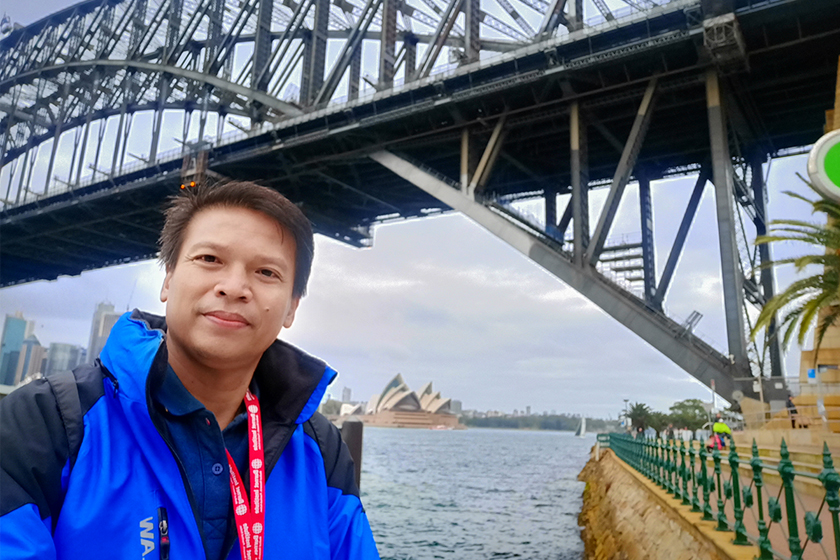Kinik Darsono, a medical doctor and Head of the Information Technology and Medical Record Division at Soehadi Prijonegoro Hospital in Sragen Regency, Central Java, has been using technology to fight the eradication of tuberculosis for the past ten years. Kinik created Telehealth, a digital imaging communication process that speeds up tuberculosis assessment, and Fast TB, an app that streamlines case reporting and mapping, patient medicine intake monitoring, and patient consultation.
“I’ve always been passionate about technology since I was a child and started learning programming on my own in junior high. I wanted to study electrical engineering, but my mother wished for one of her children to become a doctor,” Kinik laughed.
To Kinik, it was fate. “The two fields can complement each other. I saw that the majority of health costs do not come from doctor or nurse fees, but from our dependence on foreign technologies.” Kinik also realised the importance of tuberculosis prevention and eradication during his early years practicing medicine.
“I observed that with proper intervention from the start, a positive outcome is almost guaranteed. The chances of getting over tuberculosis and of the patient’s productivity going back to normal is almost 100%.”
According to the World Bank, Indonesia has achieved good progress in reducing the incidence of tuberculosis. Within 15 years between 2000 and 2015, the incidence of tuberculosis has dropped from 449 people to 395 per 100,000. The Indonesian Ministry of Health is looking to further reduce the number and has issued a ministerial regulation on tuberculosis countermeasure in 2017, setting the goal to reduce tuberculosis prevalence from 297 in 2013 to 245 per 100,000 people by 2019.
In 2009, while serving as Director of Communication and Information at TechnoPark Sragen, a technology think tank and Indonesia’s first and largest technopark, Kinik created Telehealth, to speed up Mycobacterium tuberculosis assessment.
Previously, the slides had to be shipped to the laboratory in a major city, with a wait time of 2-4 weeks for results. “The long wait time posed the risk of tuberculosis spreading if the result is positive, but also posed the risk of wrong medication if the result turns to be negative,” Kinik said.
At that time Sragen had recently become connected online, and Kinik realised that digital imaging of slides and consultation via the internet with specialist tuberculosis doctors could cut the diagnosis timeframe from weeks to almost instantaneous.
“Unfortunately, e-health was still something new in Indonesia back then, and so there were no regulations yet in place at the time and by 2010, the Telehealth program was put on hold despite its success. Indonesia didn’t have e-health regulation until 2017,” Kinik said.
That didn’t stop Kinik from innovating. Realising the importance of diagnosing tuberculosis early, he had the idea to streamline tuberculosis case reports using an Android app. Village cadres visiting villagers would ask whether they display any tuberculosis symptoms, and if they do, the village cadre click ‘report’, jotting down the villager’s name and phone number. Health workers then follow up by taking sputum samples to be diagnosed for Mycobacterium tuberculosis. They will also be able to contact the patients via WhatsApp to monitor medicine intake, which is key in eradicating tuberculosis.
In 2018, Kinik was able to bring his idea of the app, Fast TB, as his project when he participated in the Tuberculosis Prevention and Eradication short course at the Menzies School of Health Research and The Macfarlane Burnet Institute, funded by the Australian Government’s Australia Awards.
In November 2018, upon returning to Indonesia, Kinik and his short course peers piloted Fast TB in Klaten Regency, at the Jogonalan 1 community health centre. “Before the app, there were ten suspected tuberculosis cases reported. With Fast TB, there were 182 suspect cases with approximately ten per cent of them later to be confirmed positive for tuberculosis,” Kinik said.
Using Fast TB, Soehadi Prijonegoro Hospital saw an increase of 1162 confirmed positive cases of tuberculosis, compared to 684 in 2017. “Imagine if these cases went undetected or their medication went unmonitored. The patient would be at risk of evolving a drug resistant tuberculosis and of infecting others around them, and they in turn infecting others. The health cost would be exponential,” Kinik said.
What makes the app so effective is its ease of use. “An app has to be user friendly. Technology has to facilitate, and it has to lower the cost,” Kinik opined.
Kinik also highlighted that the Australia Awards short course provided a tremendous wealth of knowledge on the various aspects of tuberculosis management, from research, technical standpoint, to comprehensively managing the various factors. “The implementation of the Fast TB application has to wisely take various factors into consideration so that the implementation can be optimised,” Kinik said.
Taking this to heart, Kinik has refrained from releasing the app to the public. “There’s still a shortage of health workers to handle the increased number of tuberculosis suspect cases. As it is, there’s already a case overload for the health workers,” Kinik observed. He realises the importance of having a support structure in place first that could handle the workload. The end goal though, is for the app to be used by the villagers themselves to report suspect cases.
“If we could eradicate tuberculosis, it would increase the productivity of this country and its people significantly.”



 A doctor and programmer: eradicating tuberculosis through the help of an app
A doctor and programmer: eradicating tuberculosis through the help of an app
